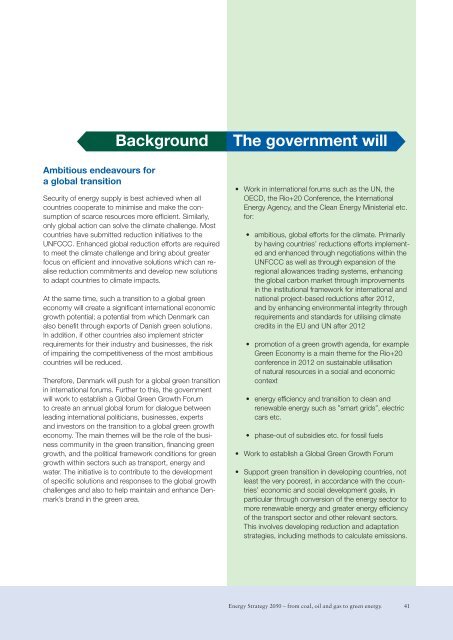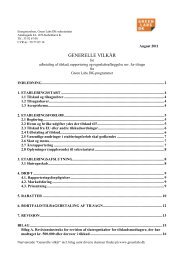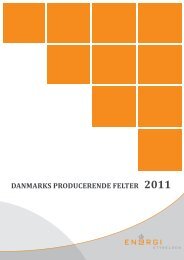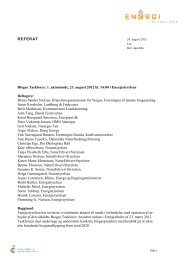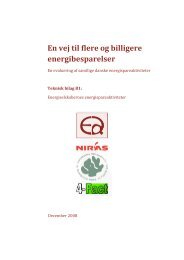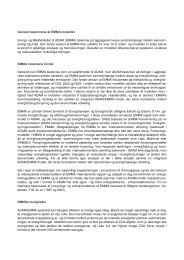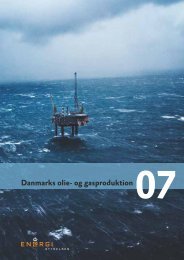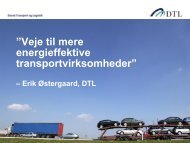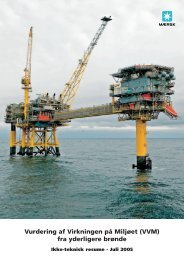Energy Strategy 2050 – from coal, oil and gas
Energy Strategy 2050 – from coal, oil and gas
Energy Strategy 2050 – from coal, oil and gas
Create successful ePaper yourself
Turn your PDF publications into a flip-book with our unique Google optimized e-Paper software.
Ambitious endeavours for<br />
a global transition<br />
Background The government will<br />
Security of energy supply is best achieved when all<br />
countries cooperate to minimise <strong>and</strong> make the consumption<br />
of scarce resources more efficient. Similarly,<br />
only global action can solve the climate challenge. Most<br />
countries have submitted reduction initiatives to the<br />
UNFCCC. Enhanced global reduction efforts are required<br />
to meet the climate challenge <strong>and</strong> bring about greater<br />
focus on efficient <strong>and</strong> innovative solutions which can realise<br />
reduction commitments <strong>and</strong> develop new solutions<br />
to adapt countries to climate impacts.<br />
At the same time, such a transition to a global green<br />
economy will create a significant international economic<br />
growth potential; a potential <strong>from</strong> which Denmark can<br />
also benefit through exports of Danish green solutions.<br />
In addition, if other countries also implement stricter<br />
requirements for their industry <strong>and</strong> businesses, the risk<br />
of impairing the competitiveness of the most ambitious<br />
countries will be reduced.<br />
Therefore, Denmark will push for a global green transition<br />
in international forums. Further to this, the government<br />
will work to establish a Global Green Growth Forum<br />
to create an annual global forum for dialogue between<br />
leading international politicians, businesses, experts<br />
<strong>and</strong> investors on the transition to a global green growth<br />
economy. The main themes will be the role of the business<br />
community in the green transition, financing green<br />
growth, <strong>and</strong> the political framework conditions for green<br />
growth within sectors such as transport, energy <strong>and</strong><br />
water. The initiative is to contribute to the development<br />
of specific solutions <strong>and</strong> responses to the global growth<br />
challenges <strong>and</strong> also to help maintain <strong>and</strong> enhance Denmark’s<br />
br<strong>and</strong> in the green area.<br />
• Work in international forums such as the UN, the<br />
OECD, the Rio+20 Conference, the International<br />
<strong>Energy</strong> Agency, <strong>and</strong> the Clean <strong>Energy</strong> Ministerial etc.<br />
for:<br />
• ambitious, global efforts for the climate. Primarily<br />
by having countries’ reductions efforts implemented<br />
<strong>and</strong> enhanced through negotiations within the<br />
UNFCCC as well as through expansion of the<br />
regional allowances trading systems, enhancing<br />
the global carbon market through improvements<br />
in the institutional framework for international <strong>and</strong><br />
national project-based reductions after 2012,<br />
<strong>and</strong> by enhancing environmental integrity through<br />
requirements <strong>and</strong> st<strong>and</strong>ards for utilising climate<br />
credits in the EU <strong>and</strong> UN after 2012<br />
• promotion of a green growth agenda, for example<br />
Green Economy is a main theme for the Rio+20<br />
conference in 2012 on sustainable utilisation<br />
of natural resources in a social <strong>and</strong> economic<br />
context<br />
• energy efficiency <strong>and</strong> transition to clean <strong>and</strong><br />
renewable energy such as ”smart grids”, electric<br />
cars etc.<br />
• phase-out of subsidies etc. for fossil fuels<br />
• Work to establish a Global Green Growth Forum<br />
• Support green transition in developing countries, not<br />
least the very poorest, in accordance with the countries’<br />
economic <strong>and</strong> social development goals, in<br />
particular through conversion of the energy sector to<br />
more renewable energy <strong>and</strong> greater energy efficiency<br />
of the transport sector <strong>and</strong> other relevant sectors.<br />
This involves developing reduction <strong>and</strong> adaptation<br />
strategies, including methods to calculate emissions.<br />
<strong>Energy</strong> <strong>Strategy</strong> <strong>2050</strong> <strong>–</strong> <strong>from</strong> <strong>coal</strong>, <strong>oil</strong> <strong>and</strong> <strong>gas</strong> to green energy.<br />
41


